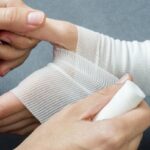
The Role of Nutrition in Wound Healing: What to Eat for Optimal Recovery
Wound healing is a complex biological process that involves tissue repair and regeneration. Proper nutrition plays a pivotal role in this process, as certain nutrients can enhance the body’s ability to repair damaged tissue and reduce the risk of infection. Understanding what to eat can significantly impact the speed and quality of recovery.
Key Nutrients for Wound Healing
- Protein Protein is essential for the synthesis of new tissue and the production of enzymes and immune cells. Insufficient protein intake can lead to delayed wound healing and increased risk of infection. Good sources of protein include lean meats, fish, eggs, beans, and dairy products.
- Vitamin C Vitamin C is crucial for collagen formation, which is a primary component of connective tissue. It also has antioxidant properties that help protect cells from damage. Citrus fruits, strawberries, bell peppers, and broccoli are rich in vitamin C.
- Zinc Zinc plays a critical role in cell proliferation and immune function. It is necessary for the activation of enzymes involved in tissue repair. Foods rich in zinc include shellfish, beef, pumpkin seeds, and fortified cereals.
- Vitamin A Vitamin A supports cell growth and differentiation, which are vital for new tissue formation. It also enhances immune function. Sources of vitamin A include carrots, sweet potatoes, spinach, and liver.
- Iron Iron is essential for oxygen transport in the blood and energy production, which are critical for cell function and repair. Iron-rich foods include red meat, poultry, lentils, and fortified grains.
- Omega-3 Fatty Acids Omega-3 fatty acids have anti-inflammatory properties that can help reduce excessive inflammation and promote healing. Good sources include salmon, flaxseeds, chia seeds, and walnuts.
- Hydration Adequate fluid intake is vital for maintaining blood volume and delivering nutrients to the wound site. Water, herbal teas, and broths are excellent sources of hydration.
Sample Meal Plan for Optimal Wound Healing
- Breakfast: Greek yogurt with fresh berries and chia seeds.
- Lunch: Grilled salmon with quinoa and a spinach salad.
- Snack: A handful of almonds and an orange.
- Dinner: Lean beef stir-fry with broccoli and bell peppers served over brown rice.
- Hydration: 8-10 glasses of water throughout the day.
Additional Tips
- Avoid excessive sugar and processed foods, as they can cause inflammation and slow down the healing process.
- Consider taking a multivitamin if you have dietary restrictions that limit your intake of essential nutrients.
- Consult with a healthcare provider or dietitian to tailor your diet to your specific needs.
In conclusion, a balanced diet rich in essential nutrients can significantly enhance the body’s ability to heal wounds. By focusing on protein, vitamins, minerals, and hydration, individuals can optimize their recovery and reduce the risk of complications.



